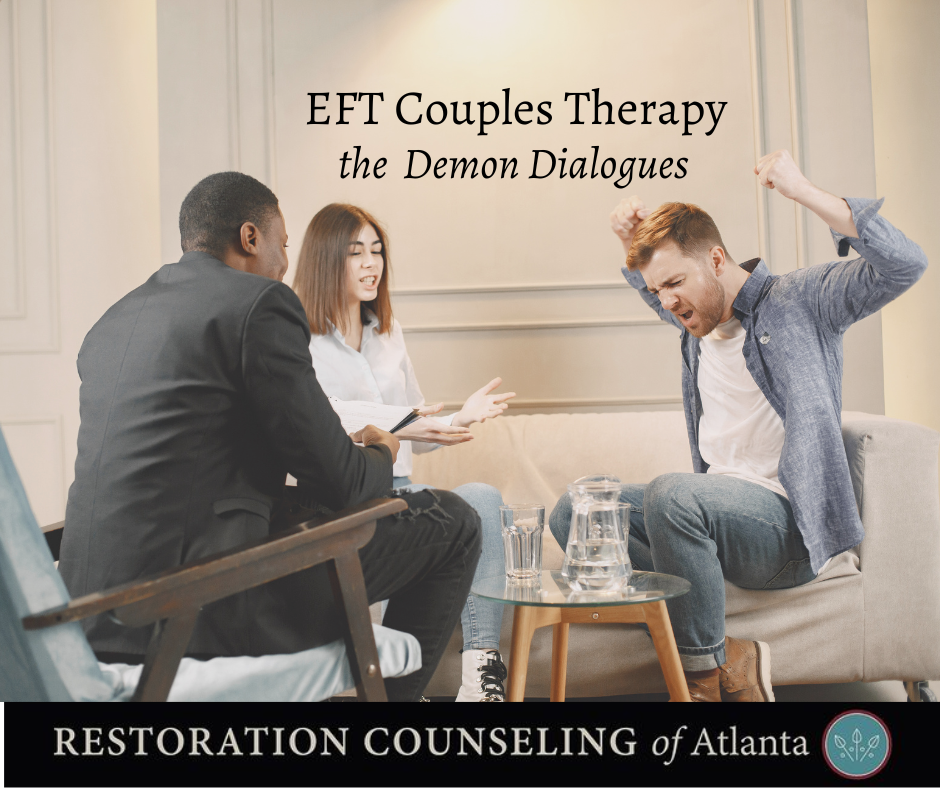The Demon Dialogues
Do you feel like you are stuck in the same argument with your partner? Does it feel like you are going in circles with no resolve? Do you feel confused by how your partner is responding to conflict? If you answered yes to any of these questions, you may be caught in one of the Demon Dialogues, and EFT couples counseling may help you get unstuck.
What are Demon Dialogues?
Demon Dialogues are negative patterns of interaction you may be having with your spouse. One of these dialogues may start when one partner tries to reach for the other and cannot make safe emotional contact. One or both partners may feel hurt, rejected, fearful, or embarrassed. You may be quick to blame the other person, but in reality, both partners are victims of the Demon Dialogue. You are both stuck in this pattern, not knowing how to get out.
Types of Demon Dialogues
There are three types of Demon Dialogues: Find the Bad Guy, Protest Polka, and Freeze and Flee. You may be able to see all three of these dialogues play out in your relationship, but for the most part, one is dominant.
Find the Bad Guy
Find the Bad Guy is a pattern of mutual blame, and it can effectively keep couples apart. The purpose of this dialogue for an individual is self-protection. In order to protect oneself, an individual may attack or blame the other person for their mistakes. If you feel hurt by your partner, it may feel like you do not have control over the situation. In order to gain back control, you may react in anger or put your partner in a negative light. You may think, “it’s not me, it’s you.”
A couple may get stuck in this dance because one person may feel cornered in the situation. They can only tend to focus on what just happened and how their partner hurt them. Eventually, this turns into a pattern where an individual begins to expect hurt and is ready to react. When this happens, the relationship becomes more and more unsatisfying or unsafe.
The Protest Polka
This demon dialogue can be more difficult to identify than Find the Bad Guy. The Protest Polka can be more subtle. The goal of the Protest Polka is to get a response from your partner. In this dialogue, typically, one partner is demanding actively while the other one is withdrawing quietly. One partner may be protesting disconnection while the other is protesting the implied criticism. This type of demon dialogue can lead to more disconnection and distress. That does not mean that there are never moments of connection.
The demander in the relationship may feel unimportant or not valued by their partner. They may feel abandoned or angry that due to their partner’s lack of responsiveness. If you are a pursuer, you may have thought, “I am just not sure I matter to him,” or “If I didn’t push and push, we would never be close.” This individual is desperately trying to connect with their partner.
The withdrawer in the relationship may feel hopeless or lack the confidence to act. They may believe they are a failure as a partner and will do anything to avoid their partner’s anger and disapproval. If you are a withdrawer, you may have thought, “I can never get it right with her, so I just give up. It all seems hopeless,” or “I shut down and wait for him to calm down. I try to keep everything calm. This is my way of caring”.
The more I _____, the more you _____ and then the more I ________, and round and round we go.
Freeze and Flee
This type of dialogue usually develops from the Protest Polka. This can happen when the pursuing or demanding partner gives up on trying to get their spouse’s attention. Partners can appear to be polite and cooperative with each other, but in reality, there is silence in the relationship. The distance created in the Freeze and Flee is a response to the loss of connection. One may feel like there is no hope of their relationship getting better. There really is no dance here in the dialogue between the two partners.
Hopelessness defines the Freeze and Flee dialogue. Both partners may think there are innate flaws that lie in themselves and there is nothing they can do about it. Instead, a partner may try to hide from the other. Each person in this dialogue may feel disconnected. This can lead to more hiding and less connection with each other. Both partners may just avoid more difficult emotions by distracting themselves rather than talking to each other.
What to do with the Demon Dialogues
- The first important step is recognizing the dialogue you and your partner may be stuck in: Focus on what is happening between you right now and see the whole picture of the dance, not just the content of the argument
- Consider the dance or pattern as your enemy rather than each other: When couples are able to join forces against a common enemy, they can work together
- Do not be afraid to ask for help: When I see couples, most do not recognize the pattern they are stuck in, they just know they are stuck. The perspective of a therapist could be helpful in seeing the pattern.
At the end of the day, we are all made for connection When our connection with our partner is threatened, emotions can feel out of control. It is okay if you feel stuck in your relationship. There are ways to get help and find healing. We are here to help!
Reference
Johnson, S. (2008). Hold me tight: Seven conversations for a lifetime of love. New York, NY: Little, Brown & Company.
 Written by: Sarah Burruss, Graduate Student Intern
Written by: Sarah Burruss, Graduate Student Intern
Roswell and Virtual
sarah@restorationcounselingatl.com
Sarah is one of our graduate student interns. She takes a collaborative approach to counsel her clients. Sarah works with adolescents and adults on a wide range of issues, including anxiety, depression, communication issues, addiction, OCD, trauma, and life transitions. She also does premarital and marital counseling. As an intern, Sarah is available at a reduced rate.

